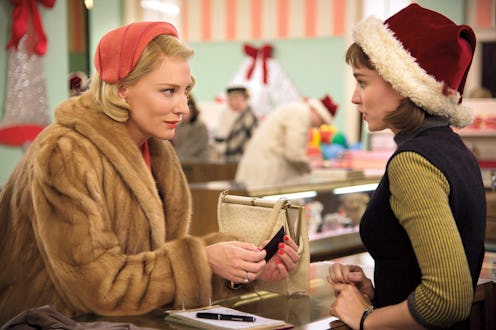
When a film is described as a "coming-of-age" tale, there are certain expectations. The main characters are probably in the throes of puberty, for one. But Carol isn't your average "coming-of-age" movie, and Rooney Mara and Cate Blanchett certainly don't play adolescents. As an inexperienced shopgirl and a divorced mother, respectively, Mara and Blanchett play two women who are nonetheless at a personal crossroads. As their unexpected friendship blooms into something more, they're left with a choice: tuck away their feelings to better fit into close-minded society or to live and love as they please, even at personal and professional risk.
These moments of revelation and decision aren't confined to a person's teenage years. And especially for Therese and Carol, who have been infantilized and controlled by men, commitment to one's own happiness is a milestone indeed. In the exclusive behind-the-scenes clip below from the Mar. 15 DVD's bonus features, the stars and director talk about Carol as a feminist coming-of-age movie, a new genre that I'd personally like to see a lot more of. In the video, director Todd Haynes describes Therese as a "girl just coming into focus, to herself, you know, and the world." When the audience meets her, she has a job, an apartment, and a boyfriend, all steps that, on paper, would indicate that most of her growing up has already been done. Of course, there's a major piece of Therese's identity that she's yet to discover herself: her sexuality. More than that, the young woman seems to be floating when she meets Carol, waiting around to find out when her life will really start. Therese has a sexual awakening, yes, but her maturity also shows in her willingness to own her choices.
Oscar nominee Mara says that the Carol script showed a snapshot of a transitional period in the lives of both main characters, which solidified her interest in the project. "They're both deciding what kind of women they want to be, what kind of lives they want to have," Rooney says in the clip of Carol and Therese. "And they're both deciding whether or not they're going to live by their truth." They support each other through those decisions, Mara goes on to say. Therese first looks at Carol as someone impossibly refined and grown-up, but that divide grows narrower as she learns about Carol's family conflicts. Carol and Therese's love story is touching and revolutionary, but so also is the way in which they come to regard each other as equals. It's an emotional partnership, not just a physical one.
Watch the exclusive clip below for more, including Blanchett's admiration of Mara's relaxed on-set demeanor. ("She's just not phased by anything.")
Especially in the context of the period when it takes place, Carol is a different kind of feminist film than usual. And calling it a "coming-of-age" story doesn't minimize the journey of either Carol or Therese. What all "coming-of-age" movies have in common isn't the age of their characters but their characters' ability to change and be changed. Carol revolves around two women who welcome that change, and that's incredibly feminist to me.
Images: The Weinstein Company; Giphy